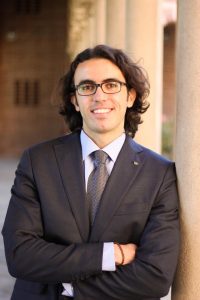Student brings successful Moroccan fashion brand to the US
Malak Mossadek, a sophomore majoring in business administration, spent his childhood in Morocco and adolescence in Boston. By combining his diverse backgrounds, Mossadek decided to create a clothing company for authentic and unique women’s wear in the United States. He aims to raise awareness for Moroccan culture as well as aspects of Western culture through his brand. With every piece of clothing handmade, sewn and exported overseas, this USC student has a one-of-a-kind company for irreplaceable products.
Daily Trojan: How did your company and brand start, and why did you decide to do it?
Malak Mossadek: La Tunique started back when I was in Morocco. I was born in Morocco, but moved to Boston when I was 13 years old. I always wanted to create something out of it. It was something that I really wanted to cultivate. There’s no handmade stuff. You cannot find this anywhere. I always wanted to push whatever I wanted in Morocco; I wanted to see these beautiful [pieces] elsewhere. Beach coverups, tunics, prom dresses, evening wear, etc.
DT: What is La Tunique, what does it stand for and why did you name it?
MM: La Tunique, it means “a single tunic” in French. I based it on the one-of-a-kind tunic that I am selling, that cannot be replicated. One designer, one fabric, pretty much exclusive. We were originally a women’s sewing company in Morocco, with two tailors and designers, and I wanted to create a brand out of it in America. I wanted a fusion clothing style that combines Westernized fashion and a Moroccan touch. Everything is handmade. We use high-premium Swarovski rocks to embellish every piece. Everything from the fabric to the sewing is 100 percent authentic work and cannot be duplicated.
DT: How has your involvement with Sigma Eta Pi, a co-ed entrepreneurship fraternity on campus, helped with the development of La Tunique? What have they taught you about building your own start-up business?
MM: When you surround yourself with like-minded people, it’s extremely helpful and valuable. Being part of the fraternity has a served as a business incubator. The members have guided me in finding mentors, exchanging ideas and learning about import, exports and supply chain. I feel like if I go overseas, to expand in China or India, I have people to help me promote it and make it happen because the diversity of SEP can help me expand globally. It’s all about bringing the culture to a diverse city like Los Angeles.
DT: What are some other upcoming projects coming up with your brand?
MM: “Kaftan” means a woman’s long dress, like an Indian sari. Right now we’re doing more casual wear, like tunics and beach coverups, but we want to expand to more high-end evening wear, like prom dresses. Now to L.A. to see how it fits on non-Moroccan people, I really wanted to see people in different backgrounds. We’re also working on a website that is launching soon.
DT: Could you describe some qualities that you use as a business leader for La Tunique?
MM: For a fledgling business to cross the chasm from startup to successful enterprise, one needs analytical skills, judgment, research and planning skills and a sophisticated understanding of banking products and services.
DT: How has your cross-cultural background affected the way you view the business world? What kind of impact do you hope to bring with La Tunique?
MM: Being at a crossroads of cultures — African, Arabic and European — allowed me to experience my personal development while helping me see that there are limitless opportunities for emerging markets to connect with the world. What’s needed now, and what I hope to achieve, is to become an educated business leader who is willing to make those connections and do what comes naturally to them: to dream, take chances, and see opportunity where others might see a rusty old scrap heap.

